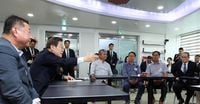On June 13, President Lee Jae-myung made a significant visit to the northern border regions of Gyeonggi Province, including Paju and Yeoncheon, to engage directly with residents who had long suffered from the noise and tensions caused by inter-Korean propaganda broadcasts. This visit came just two days after President Lee instructed the South Korean military to cease its loudspeaker broadcasts targeting North Korea, a move that prompted North Korea to halt its own broadcasts aimed at South Korea the following day.
The border areas, particularly Paju's Jangdan-myeon and the village of Tongilchon, have endured over a year of relentless noise pollution from North Korean loudspeakers. These broadcasts, which included disturbing sounds such as animal cries and ghostly noises, caused not only severe discomfort but also tangible harm to residents’ livelihoods. Livestock deaths and mental health struggles, including hospital visits, were reported among the affected communities.
During the meeting at the Jangdan-myeon Administrative Welfare Center in Paju, President Lee expressed heartfelt sympathy for the residents' prolonged suffering. "You have suffered a lot. It is truly fortunate that our stopping (broadcasts) immediately led North Korea to stop, resolving the noise damage," he said, emphasizing the relief brought by the cessation of the broadcasts. He added, "We should minimize actions that waste electricity and cause mutual distress. The government will work harder to ensure such incidents do not recur." His remarks underscored a commitment to fostering stability and peace in these sensitive border areas.
Mayor Kim Kyung-il of Paju, who accompanied President Lee during the visit, expressed deep gratitude on social media for the president's efforts and stressed the importance of continued attention to border residents’ welfare. He highlighted the hope that halting the North and South Korean broadcasts would serve as a stepping stone toward broader inter-Korean reconciliation. "I earnestly wished for the restoration of inter-Korean relations while discussing stability and peace with President Lee," Kim wrote.
The president also addressed the economic hardships faced by border communities, which are closely tied to the state of inter-Korean relations. "If tensions worsen, the border region’s economy suffers greatly," Lee noted, pledging to work toward rapid economic recovery. Earlier in the day, he had visited Yeoncheon County Office to review the status of the basic income pilot project and spoke with local small business owners. At a chicken restaurant, for example, he encouraged the owner who credited basic income with helping sustain the business, suggesting that increased use of local currency could further boost sales.
One particularly poignant moment during the Paju discussion came when a resident lamented the distress caused by North Korean propaganda balloons. President Lee responded firmly, reiterating that the illegal sending of leaflets to North Korea violates South Korean law and that he had already instructed authorities to prevent such actions. He stated, "Sending propaganda leaflets illegally violates the Inter-Korean Exchange and Cooperation Act and must be strongly punished." Furthermore, he condemned the unauthorized use of high-pressure helium gas in balloon launches as a clear violation of the High-Pressure Gas Safety Control Act, instructing Mayor Kim to arrest offenders on the spot.
These measures reflect a broader stance by the new administration, which, since President Lee’s inauguration, has sought to balance firm security policies with efforts to reduce hostilities. The cessation of loudspeaker broadcasts marks a notable shift in inter-Korean dynamics, with the military halting South Korea’s broadcasts on June 11 at 2 PM and North Korea following suit by ending its broadcasts on the night of June 11. The South Korean military confirmed that as of June 12, no North Korean loudspeaker broadcasts were being detected in South Korean border areas.
Residents of Tongilchon and Daeseong-ri, who have endured the broadcasts’ noise for months, warmly welcomed President Lee’s visit and the relief his policies have brought. The head of Daeseong-dong, Kim Dong-gu, expressed profound thanks, noting that he had appealed to the United Nations and other bodies for nearly a year to end the broadcasts. "If we had known the president was coming, we would have prepared a thank-you banner," Kim said. He praised the president’s swift action in resolving a problem that had long plagued the community.
President Lee acknowledged the delicate nature of these changes, stating, "I do not yet know if North Korea’s cessation of broadcasts is temporary or permanent, but we will manage the situation carefully." He also praised the high civic consciousness of border residents, which helped avoid major backlash during this sensitive transition.
The president’s visit to the border region was not limited to security issues. In Yeoncheon, he checked on the rural basic income pilot project, a program he initiated as governor of Gyeonggi Province that had successfully increased the population in the area during its early stages. Engaging with local business owners, he listened attentively to their concerns and offered encouragement, blending economic support with his peace-building efforts.
Overall, President Lee’s actions and words during this visit signal a new chapter for the tense border communities, combining pragmatic governance with a hopeful vision for peace. The cessation of propaganda broadcasts, the crackdown on illegal leaflet launches, and the focus on economic revitalization together form a multifaceted approach to improving life along the border and easing the fraught relationship between the two Koreas.
As the border region residents begin to enjoy quieter nights and renewed hope, the broader implications of these developments will be closely watched. Whether this marks a lasting thaw in inter-Korean relations remains to be seen, but for now, the residents of Paju and Yeoncheon have found a moment of peace and a leader committed to their welfare.


